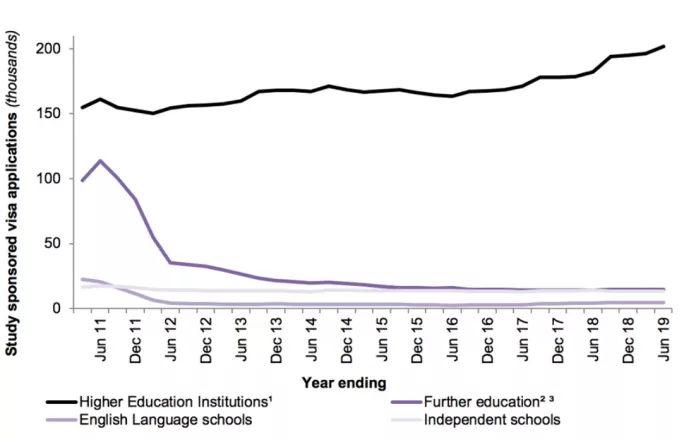- Home
- Colleges struggling to grow international recruitment
Colleges struggling to grow international recruitment

Tight immigration rules and the lack of a “welcoming message” are hampering the growth of the number of international students, colleges fear.
The latest figures from the Home Office, analysed by Tes, show that in the year ending June 2019, the number of study sponsored visa applications for the further education sector (which includes tertiary, further education and other colleges, such as private institutions) rose by 3 per cent to 14,783. These relate to so-called tier 4 visas for non-EU students - visas which require sponsorship from a licensed organisation.

In 2010, that figure stood at more than 65,000. The increase was also significantly below the increase seen by the education sector as whole, which was 9 per cent, and that of universities, at 11 per cent. A total of 663 students applied for an extension of stay for study in FE in 2018 - a similar number to the previous year but significantly below the 30,547 applications in 2010.
News: International student report ‘woeful’, say colleges
Background: Colleges earn £57m from international work
Brexit: ‘England is home now’: The EU students left in limbo by Brexit
Education exports
Meanwhile, statistics released last week by the Department for Education revealed that the fee income for the further education sector from non-EU international students dropped by 61 per cent between 2010 and 2017 - from £230 million to £90 million.
Emma Meredith, international director at the Association of Colleges, said the figures did not include EU students or the short-term study visa route, “which is very popular in the college sector for short-term study and English language courses”.
She explained there were a number of reasons why there had been less growth of international provision in the college sector, but “fundamentally it’s because of the current UK student visa system”.
“Over the last 10 years it’s become harder and harder for colleges to recruit international students because visa rules have made the college offer less attractive; student part-time working rights were taken away, college students had to go home to extend their study visas and students in countries where there is demand for UK technical education have found it very difficult to get visas.”
Ms Meredith said the system had “progressively pushed more responsibility and cost on to all institutions” to conduct checks on international student applicants, with the result that for some colleges it “became too risky and simply unviable to stay in tier 4” recruitment.
“We do need a robust and fair visa system that ensures all educational institutions are in a position to admit international students, yet while the visa system has now begun to stabilise and recent policy changes have started to address some of the differentiation in how FE colleges are treated within the system, UK colleges are still not in a position of parity in comparison with other types of providers and our international competitors.”
The general political atmosphere has not helped, colleges believe, with anti-immigration rhetoric grabbing headlines and Brexit looming. On the campaign trail this week, Boris Johnson said under a Conservative government, there would be a decrease in the number of migrants coming to the UK, due to increased controls.
“To some, Brexit sends a message that the UK isn’t open for business - hence if the UK leaves the EU, there will be a lot of work to do to prove that we still want international students to choose us over our many competitors,” Ms Meredith added. “I think the general atmosphere is definitely important because instability and uncertainty will put some students off, although currency fluctuations have made the UK more financially attractive for some.”
Operational barriers
On top of political barriers, there are also operational barriers to colleges growing international provision - including metrics around recruitment, attainment and retention which are more suited to numbers recruited by universities than the often smaller provision of colleges.
Tier 4 visa sponsor colleges also require an Ofsted grade 1 or 2, as well as training staff to support international students. “We also can’t pretend that in recent times colleges have had much encouragement from officials to engage in international work; it’s been seen as a costly distraction without due consideration to the benefits,” said Emma Meredith.
“I don’t think that what colleges can offer internationally has always been understood or recognised, but I do think we are starting to see this position shift. Ever since I started working in the college sector, I’ve struggled to understand why colleges shouldn’t be able to work internationally if they do it carefully and for the right reasons. Yes, colleges have first and foremost an important community role to play but they shouldn’t be denied a more global outlook.”
Mark Allen, international director at East Sussex College Group said “lots of colleges” had dropped out of offering international activity through tier 4 sponsorship, largely due to the UK’s immigration policies - although he said they had recently improved. Brexit had also impacted colleges’ ability to recruit. “Brexit has created instability. We have not lost very much, but we have seen a decline in EU students. As a sector, we have seen the number of EU students dropping.”
He said the rule that colleges had to be rated “good” or “outstanding” by Ofsted was an area of concern for a number of colleges. “That could potentially be the death knell for the college. The British Council inspect everything and the fact is that we have that level of quality and we are still at risk from that as everyone else.”
Mr Allen said his college group has seen a small increase in its international provision over the last couple of years, despite it being “a competitive and unstable market”.
The college group’s language school is British Council-accredited, he explained, and rated the best government-funded college in the UK for the last eight years. “We are also in the top 5 per cent overall, including private language schools.” Around half of the roughly 1,000 international students that attend the college across the year come from the EU.
The college has had to adjust to a changing environment, he said, which meant rather than having a student intake about three times a year, students were now coming to the college at all points throughout the year - some for two-week courses, some for much longer courses, A levels and vocational courses. “There is now a lot of churn. We have to be very flexible.
“We don’t have a clearly welcoming message. Even if you are non-European, the message around Brexit is instability. It is just not welcoming. If there is someone who wants to do five years of education, say A levels and then a degree, that is a huge investment. And still we are saying you have to go home and apply again. If I was a parent, I would be concerned.”
International engagement “absolutely, undoubtedly” remains worthwhile for the college, though, he stressed. “It is a funding source that we couldn’t get any other way. But also, for us, because of where we are, there are softer benefits for our local students.”
A spokesperson for City of Glasgow College said foreign students were disadvantaged: “Non-EU college students are currently disadvantaged by the restrictions on the number of hours they can work while studying. If colleges were aligned with universities, where students can work up to 20 hours a week and full-time during the holidays, it would give all FE and HE students the same incentive across Scotland’s tertiary sector.”
Keep reading for just £1 per month
You've reached your limit of free articles this month. Subscribe for £1 per month for three months and get:
- Unlimited access to all Tes magazine content
- Exclusive subscriber-only stories
- Award-winning email newsletters



